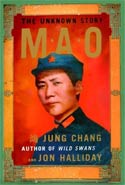
Jung Chang, author of Wild Swans, has recently published a new book on the life of Mao, Mao: The Unknown Story. A review by Nicholas Kristof is available on-line through the New York Times. (Reader reviews are divided on Amazon.com.)
From the Amazon.com website, 5 Things You'll Learn from Mao:
1. Mao became a Communist at the age of 27 for purely pragmatic reasons: a job and income from the Russians.
2. Far from organizing the Long March in 1934, Mao was nearly left behind by his colleagues who could not stand him and had tried to oust him several times. The aim of the March was to link up with Russia to get arms. The Reds survived the March because Chiang Kai-shek let them, in a secret horse-trade for his son and heir, whom Stalin was holding hostage in Russia.
3. Mao grew opium on a large scale.
4. After he conquered China, Mao's over-riding goal was to become a superpower and dominate the world: "Control the Earth," as he put it.
5. Mao caused the greatest famine in history by exporting food to Russia to buy nuclear and arms industries: 38 million people were starved and slave-driven to death in 1958-61. Mao knew exactly what was happening, saying: "half of China may well have to die."
This is a recent BBC article about Mao's influence in China today:
Mao still powerful in modern China: Many in China know very little about the persecution and bloodshed orchestrated by Mao Zedong's Gang of Four. Mao is still hailed by the authorities in China as an inspiring symbol.





